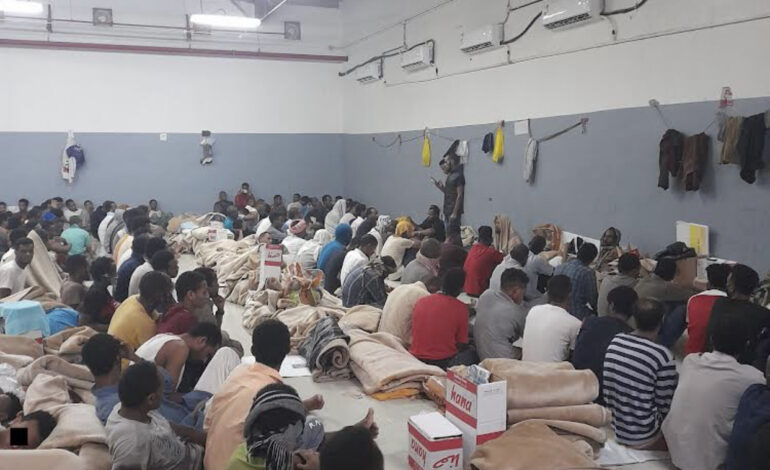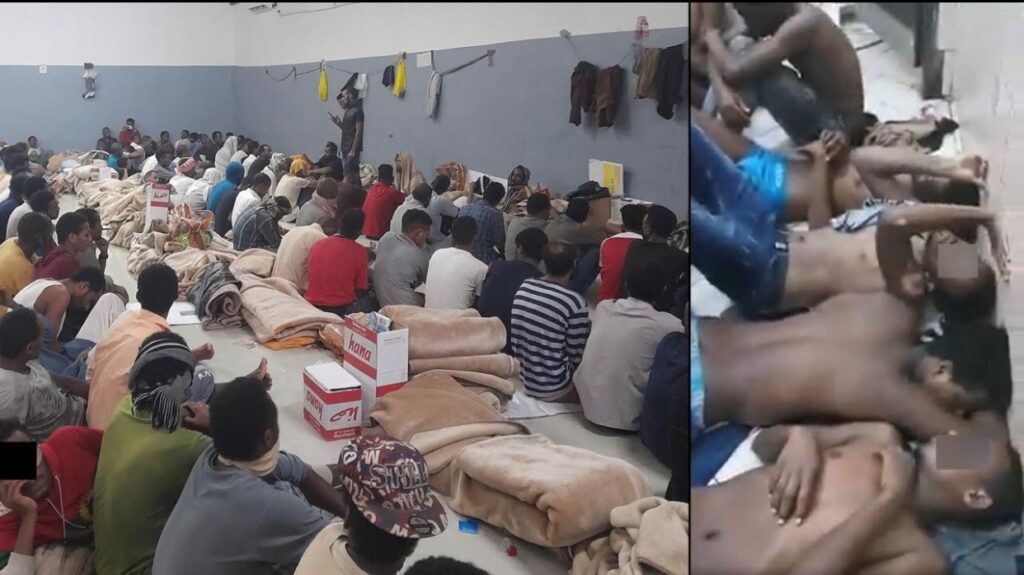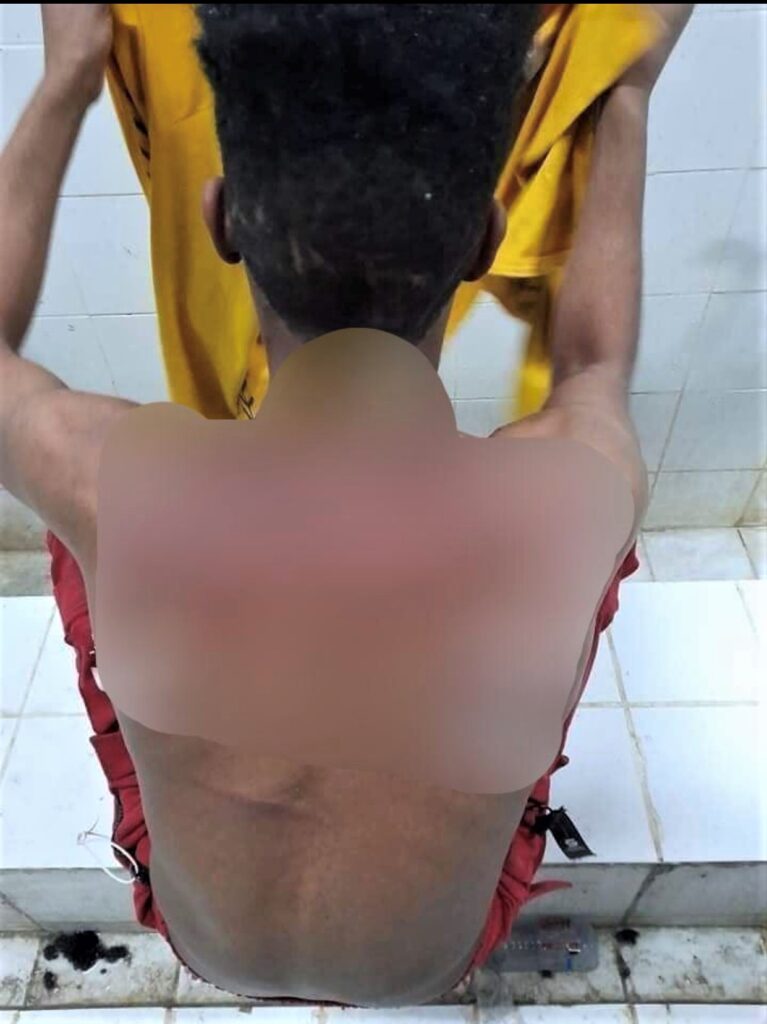
By Faith Nyasuguta
Thousands of Ethiopian migrants currently locked up in Saudi Arabia prisons are living in petrifying conditions.
Revealed images show that the prisons are overcrowded and that the prisoners are staying in dirty cells where they are beaten, mistreated, starving, and in need of medical help.
An observer residing in Ethiopia recently revealed to France 24 how 10 Ethiopians have recently succumbed to these conditions.
On August 23, the Ethiopian embassy in Saudi publicized the names of 10 Ethiopians including a minor who died at the al-Shumaisi detention center in Jeddah.
One Ethiopian Human Rights Activist Arafat Jibril Bakrii, who is often in contact with Ethiopians who are detained in Saudi prisons revealed that illnesses such as diarrhea and infections triggered by the unhygienic conditions are prevalent.
Thousands of Ethiopian migrants currently locked up in Saudi Arabian prisons are living in petrifying conditions.They stay in dirty cells where they are beaten, mistreated, starved and they need medical help.
As we hit June this year, Saudi authorities commenced the arrest of Ethiopian migrants in large numbers including those with documents and declared legal. The authorities nabbed migrants in cafes, streets and even after house raids.
After bilateral agreements with Saudi authorities, Ethiopian authorities have been organizing regular repatriation flights for Ethiopian nationals in the nation.
On July 7 this year, 35 such flights from Addis Ababa helped repatriate 40,000 Ethiopians according to the International Organisation for Migration.
Abu Bakar, (not his real name) is an Ethiopian locked up in a detention center near Riyad.
“There are more than 350 of us squeezed into one room. Some of us are forced to go and sleep in the toilets with all of the nauseating smells, simply because there’s not enough space. It’s really hot, and we get very little food, just one baguette a day, served in the evening. Lots of people are ill because of that, they’ve got diarrhea and are feverish.
I don’t even have enough money to buy a razor to shave my beard and hair. They just give us a small bottle of water for the whole day. We’re often forced to drink toilet water.
Sometimes, the prison guards beat us up, if they discover that we have a mobile phone for example. It’s hell here. We could die.
I came to Saudi Arabia to work and help my family. But four months after I arrived, I was arrested and I’m rotting away here in this prison, even though I haven’t committed any crime. The one thing I did wrong was not to have a residency permit.

On August 23, the families of those in detention rallied in front of the Saudi Arabian embassy in Addis Ababa, Ethiopia’s capital. They were calling on the Saudi nation to halt all the abuses in their jails.
Figures revealed by an Ethiopian state television show that around 80,000 Ethiopians are currently detained in the kingdom.
Din Mufti, the mouthpiece of the Ethiopian foreign affairs ministry said on July 2 that Ethiopia considered the wave of imposed repatriations part of the pressure exerted by the Arab League, including Saudi Arabia, as they seek to dissuade Ethiopia from filling the dam reservoir for its disputed Grand Ethiopian Renaissance Dam.
Built by Ethiopia in the upstream part of the Nile, this dam has been the source of tensions between Ethiopia, Egypt and Sudan since 2011. Egypt and Sudan think that the dam will affect their water supplies.
Arafat Jibril Bakrii, the president of the Oromo Human Rights Organisation (the Oromo are an Ethiopian ethnic group) details that the living conditions of Ethiopian migrants in detention centers have worsened considerably.
“A woman told me she saw a fellow prisoner die in front of her”
He narrates: “A few months ago, the people who I was in contact with were telling me they were getting three meals a day and that they had access to a doctor when they were ill.
But now, they only get a piece of bread, and water is essentially given out drop by drop. This sudden change in their living conditions can be explained by the growing number of arrests and detentions.
When the consulate visited the al-Shumaisi detention centre in Jeddah, they found out that 10 Ethiopians, including a 6-year-old child, had died. It’s just the tip of the iceberg. The Ethiopian consulate doesn’t have access to every Saudi prison, only certain holding centres like those in Riyad and Jeddah.
Often, before being taken to a detention centre, Ethiopians who have been arrested are put in prisons. And no one knows how many Ethiopians die in these prisons. I only occasionally get direct testimony coming out of those prisons.
A month ago, a woman who was detained in a women’s prison in Jeddah told me that one of her fellow prisoners died in front of her. She was extremely weak, but they didn’t know what she was suffering from.
I spoke with a man who had been beaten by guards because they’d found a mobile phone on him. They took him out into the courtyard, lashed him with a whip and threw water all over him, then took him back to his cell.

This photo was sent to me from the al-Shumaisi detention centre in Riyad. The person explained to me that there were 500 men locked into this room. Men detained in the same centre sent me a photo of a fellow prisoner who was extremely thin. They were worried about his health, because he hadn’t been taken to see a nurse or to the hospital.”
In a probe published in October 2020, Amnesty International reported increasing cases of torture against Ethiopian detainees. They highlighted two people who had received electric shocks after complaints about the prevailing conditions.
Amnesty thus urged the Saudi Arabian authorities to “immediately and significantly improve detention conditions, end torture, and other ill-treatment, and ensure detainees have access to adequate food, water, sanitation, health care, accommodation, and clothes”.
Other Ethiopian News:




